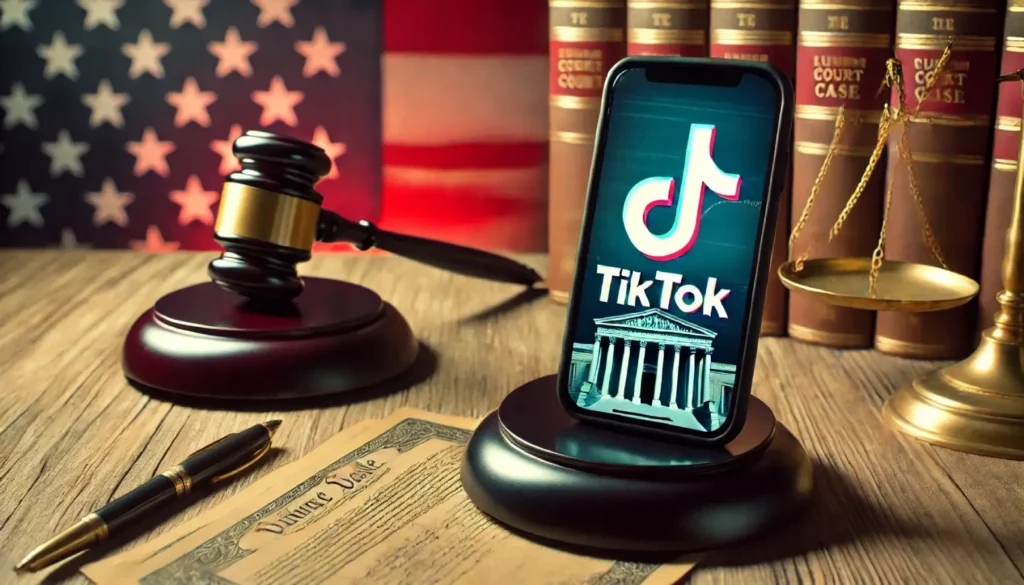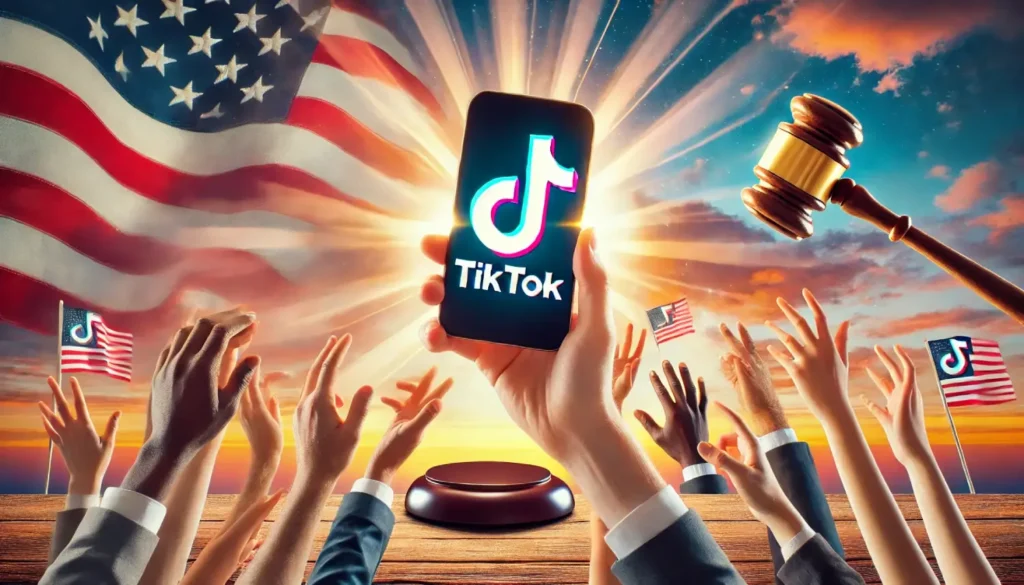The looming TikTok ban has sparked widespread concerns among legal and civil rights groups. The American Civil Liberties Union (ACLU) has appealed to the Supreme Court, emphasizing the potential threat to free expression. Millions of users now await clarity on the platform’s future amidst complex legal debates.
Background of the TikTok Ban
The TikTok ban, signed into law in April 2024, raised significant concerns among users. The legislation aims to restrict the platform’s operations in the U.S., citing security risks. It is set to take full effect on January 19, 2025, unless blocked by legal action.
TikTok has contested the directive, focusing its efforts on delaying or overturning the ban. Legal proceedings have played a central role, with the company appealing for judicial intervention. The case now awaits the U.S. Supreme Court’s review, adding weight to the ongoing debate about digital rights.
At the core of TikTok’s resistance lies its refusal to separate from its parent company, ByteDance. This decision has led to mounting pressure from lawmakers citing national security concerns. The app’s popularity and influence have fueled tensions, placing it at the heart of critical legal and political discussions.
What are the reasons behind the ban?
The primary concern revolves around alleged risks tied to national security interests. Officials argue that TikTok’s ownership by ByteDance raises critical questions about data privacy. The possibility of unauthorized data access by foreign entities has heightened these apprehensions.
Another issue centers on accusations regarding data sharing with the Chinese government. This concern emphasizes fears about sensitive user information being misused for surveillance purposes. These allegations have been a driving force behind calls for stricter regulatory measures.
Critics suggest that foreign-owned platforms might influence or control the flow of information. The potential for propaganda or misinformation to shape public opinion has amplified scrutiny. Such claims have fueled ongoing debates about balancing security with constitutional freedoms.
Initial legal developments
The US Court of Appeals for the D.C. Circuit recently denied TikTok’s request for an emergency injunction. This decision allowed the law banning TikTok to proceed, despite arguments about First Amendment implications. The court justified its ruling by citing national security concerns raised by the U.S. government.
Following this, the Supreme Court has agreed to review TikTok’s challenge against the ban. This move sets the stage for a significant legal battle over digital rights and speech protections. The oral arguments scheduled for January will determine whether the ban remains enforceable.
What is the role of the ACLU in uplifting the TikTok ban?

The ACLU has taken a prominent role in addressing the proposed TikTok ban. Partnering with organizations like EFF and the Knight First Amendment Institute, it presented a detailed legal argument. On December 17, 2024, these groups submitted an amicus brief urging the Supreme Court to intervene.
The legal brief highlighted how the ban raises serious concerns about users’ constitutional rights. By emphasizing free expression and access to information, it sought to challenge government overreach. The ACLU’s collaboration underscores the importance of protecting public discourse in a connected digital environment.
Key points in the ACLU’s argument:
The ACLU’s arguments focus on safeguarding constitutional protections while questioning the government’s justification for censorship.
- Free Speech Concerns: The ACLU emphasizes the platform’s importance for expression and information-sharing for millions. Limiting access threatens the diversity of opinions central to democratic values.
- First Amendment Rights: The organization argues the ban infringes on protected rights to speak and receive ideas. Such restrictions, they assert, demand strict and justified legal scrutiny.
- Insufficient Security Evidence: They challenge the lack of credible proof showing TikTok poses immediate risks. Claims of harm, they argue, fail to justify such sweeping restrictions.
- Misuse of National Security: The ACLU critiques reliance on “national security” as a justification without substantial evidence. Overgeneralizing security concerns risks eroding fundamental rights unnecessarily.
- Global Implications: They caution against practices resembling restrictions common in repressive governments. Allowing such bans may lead to broader limitations on media and platforms.
What could be the consequences of the ban?
This ban could create a model for restricting access to foreign media platforms. It risks influencing decisions on regulating digital spaces under the guise of national concerns. The long-term implications may impact how content is accessed across international borders.
Risks of repressive practices:
Adopting such measures echoes approaches linked with less democratic governance structures globally. Governments may exploit security concerns to restrict freedom of speech and information flow. This risks normalizing censorship, contradicting foundational principles of democratic systems.
Freedom of expression at stake:
The ban could limit individual freedom to engage with diverse viewpoints and perspectives. Platforms like TikTok allow users to share creative content and communicate globally. Removing access undermines the ability to participate in open digital dialogues.
Impact on ideological regulation:
Allowing bans based on ideological or political concerns sets a worrisome regulatory trend. Decisions influenced by perceived biases could lead to uneven enforcement of restrictions. This diminishes trust in fair governance of digital spaces and user rights.
Global comparisons and reflections:
Such restrictions align with practices in nations where information control is widely critiqued. Actions of this nature challenge the image of promoting open discourse and innovation. Observers may question commitments to upholding freedom of expression in a digital context.
Perceptions of the US democratic values:
International observers may view the decision as inconsistent with ideals of transparency and freedom. This could diminish the credibility of efforts advocating for similar rights abroad. Protecting digital platforms aligns with maintaining values of open communication and inclusivity.
What are the upcoming legal proceedings?
The US Supreme Court has scheduled oral arguments for January 10, 2025. These hearings will focus on determining the constitutional validity of banning TikTok. The outcome could set significant precedents for how digital platforms are regulated nationwide.
The Court’s decision will influence the interpretation of constitutional protections in the digital age. Advocates emphasize the need to balance national security concerns with First Amendment rights. This case could define the boundaries of government action in online spaces.
If the Court blocks the ban, TikTok could continue operating while legal challenges proceed. However, if the Court upholds the law, the platform’s removal would significantly impact users. The judgment will resonate beyond TikTok, potentially affecting other international platforms.
These proceedings are being closely watched for their implications on free speech and digital rights. Legal experts stress the importance of addressing concerns without overstepping constitutional boundaries. The decision will carry substantial weight in shaping the future of online expression.
What do experts think about the ban?
Experts have weighed in, raising critical concerns about censorship, national security, and the broader impact on democratic values.
Patrick Toomey
Patrick Toomey emphasized the importance of protecting free speech through constitutional scrutiny. He argued that restricting a platform like TikTok limits millions from expressing themselves freely. Toomey pointed out the high threshold required to justify censorship under U.S. law.
Toomey critiqued the lower court’s interpretation, highlighting missed nuances regarding users’ rights. He explained that the law impacts fundamental freedoms tied to sharing and receiving information. According to him, addressing national security concerns should avoid overreaching restrictions.
David Greene
David Greene challenged the narrative that banning TikTok ensures national security without concrete evidence. He argued that alternative solutions must be considered before resorting to outright prohibitions. The burden of proof, he added, rests on showing imminent harm.
Greene explained how censorship justified by vague claims risks becoming a recurring governmental tool. He urged the Supreme Court to consider the broader implications of restricting platforms under such conditions. Decisions grounded in evidence, he said, preserve rights without unnecessary sacrifices.
Jameel Jaffer
Jameel Jaffer raised concerns about parallels between censorship practices and actions seen in restrictive regimes. He asserted that blocking TikTok undermines democratic principles tied to free information exchange. Such moves, Jaffer warned, weaken trust in democratic governance.
Jaffer questioned the reasoning behind linking TikTok’s operations to immediate national security threats. He stated that speculative harm should not justify restricting access to such platforms. Upholding these freedoms, he argued, reflects core democratic values.
Final word
The ACLU’s position emphasizes the protection of free expression in the face of restrictions. This case highlights significant concerns about limiting access to widely used communication platforms. TikTok’s ban poses critical questions about the balance between national security and individual freedoms.
